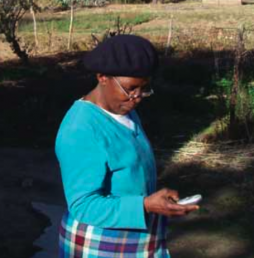woman
Posted by MelissaUlbricht on May 17, 2011
Targeting women with mobile phones and mobile-based projects can bring great benefits and opportunities, as we outlined in Part 1 of our series on women and mobiles. But, there is a “darker side” to this world, which includes changes in gender relations and power dynamic, a potential increase in violence, substitution of money or a change in expenditures, invasion of privacy, and increased control by a male partner.
Changes in Gender Relations and Power Dynamics
When the traditional social dynamic of a household is patriarchal, introducing a mobile phone into the hands of the woman can challenge the existing gender structure. Trina DasGupta, mWomen Programme Director for the GSMA Development Fund, writes in an e-mail to MobileActive.org, “threats to the status quo have sometimes been viewed negatively by community leaders and we have seen examples of this gender discrimination manifesting itself when women gain greater access to empowering tools, such as the Internet or mobile phones.”
Women themselves may not agree. The GRACE project study in Kenya, for example, finds that women do not perceive mobiles at tools for males. “Unlike our literature review that suggested that the mobile phone is culturally construed as a male tool, the women entrepreneurs did not perceive the phone as such. However, the study does indicate that usage of the phone is culturally construed, with an increase in responsibilities and empowerment for one or other profession socially construed as women’s work.”
A paper by Aramanzan Madanda looks at gender relations and ICT adoption in Uganda (the work will soon be published in book format) and finds that “existing gender structures have been dented and that patriarchy is stressed by adoption of the technologies especially mobile phones leading to transformation of gender relations to an extent.”
Posted by MelissaUlbricht on May 11, 2011
A village in India last year banned unmarried women from using mobile phones for fear they would arrange forbidden marriages. The village council suspected young men and women were secretly calling one another to arrange to elope. Meanwhile, unmarried men could use mobile phones under parental supervision.
As mobile penetration increases across the developing world, the entry of mobile phones in the hands of women causes reactions. In many cases, mobile phone ownership empowers women in myriad ways: economic gains, increased access to information, greater autonomy and social empowerment, and a greater sense of security and safety.
But, there is a darker side. Targeting women with mobile phones can cause changes in gender dynamics and family expenditures and may relate to increases in domestic violence, invasion of privacy, or control by a male partner.
Posted by KatrinVerclas on Mar 09, 2009
Today is International Women's Day and we are celebrating by featuring innovative women in the MobileActive.org community who are making a difference by using mobiles for social impact. Many of these social innovators are indeed focusing their work on improving the lives of women - their health, incomes, and social and political well-being. We salute you all!
Melissa Loudon is a research officer at the Centre for Spatial Data Management at the University of Capetown in South Africa. She is also a talented mobile developer who used to work at Cell-Life, and she has written extensively for us, testing applications. Her most recent review of mobile tools for social development focused on data collection using a mobile phones.

